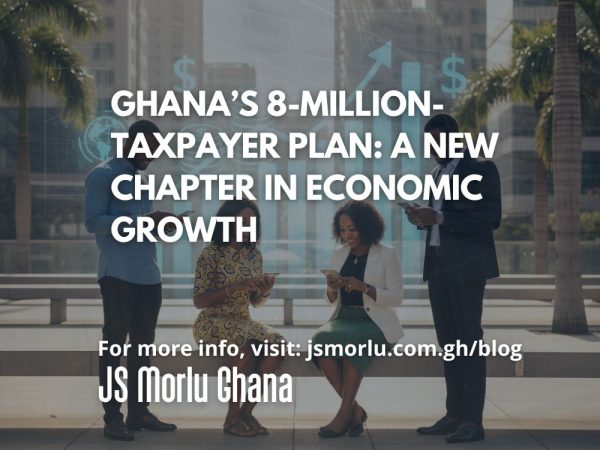A Bold Step Toward Fiscal Independence
The Ghana Revenue Authority (GRA) has unveiled one of its most ambitious initiatives yet a drive to onboard eight million new taxpayers in an effort to expand the country’s revenue base and reduce its reliance on external borrowing.
This massive expansion effort, projected to generate up to GH¢40 billion in additional domestic revenue, is anchored on two major programs:
- The Sustained Tax Education Programme, and
- The Modified Taxation Scheme (MTS).
Both initiatives are designed to simplify compliance, encourage voluntary participation, and modernize Ghana’s tax system for a digital era. 
The Vision: Turning Every Citizen Into a Stakeholder
According to Anthony Kwasi Sarpong, Commissioner-General of the GRA, this project represents “one of the Authority’s most significant revenue expansion strategies in recent times.”
By widening the tax net from 19 million to 27 million potential contributors, the GRA aims not only to strengthen fiscal stability but also to empower citizens to directly participate in national development.
Under the first phase, the Authority plans to register two million new taxpayers each year for the next three years, a structured rollout designed for efficiency and sustainability.
Why This Matters: From Informal to Inclusive
Ghana’s informal sector which includes roughly eight million economically active individuals and small enterprises, represents the country’s largest untapped tax potential.
Many of these workers operate outside the formal tax system, often because the process is seen as complicated or intimidating. The Modified Taxation Scheme seeks to change that narrative by:
- Simplifying tax filing through digital tools and mobile platforms
- Offering flexible payment options for small traders and artisans
- Providing clear, ongoing education about tax responsibilities and benefits
This new approach signals a shift from enforcement to empowerment focusing on collaboration rather than compulsion.

Technology Meets Transparency
The GRA’s vision goes beyond paperwork. Digital transformation is at the heart of the expansion strategy. By integrating technology into registration, filing, and payment systems, the Authority aims to:
- Reduce human error and revenue leakages
- Enhance data-driven decision-making
- Promote voluntary compliance through user-friendly platforms
This digital pivot aligns with global best practices and sets the stage for a more transparent, accountable, and efficient tax ecosystem.
The Ripple Effect: Fueling Ghana’s Economic Future
If executed successfully, this initiative could become a cornerstone for Ghana’s long-term fiscal independence. The projected GH¢40 billion in additional revenue would:
- Fund critical infrastructure projects such as roads, schools, and hospitals.
- Support social welfare programs and job creation.
- Reduce dependence on foreign loans, helping stabilize the cedi and strengthen investor confidence.
In essence, the GRA’s effort could transform taxation from a civic duty into a national growth engine.

A Call to Collective Responsibility
The GRA has called on citizens, private sector leaders, and civil society organizations to actively participate in this modernization effort. Building a sustainable tax culture requires trust, education, and collaboration values that must be shared across all sectors.
As Mr. Sarpong emphasized, “The Modified Tax Scheme has huge potential. If we bring two million new taxpayers into the net each year, we can significantly increase domestic revenue and support national development.”
The Road Ahead: Building a Culture of Compliance
Ghana’s tax transformation is more than an administrative upgrade it’s a cultural shift. By integrating digital systems, streamlining processes, and investing in public education, the GRA is laying the groundwork for a fairer, more inclusive tax environment.
The journey ahead will require persistence and partnership, but the payoff could redefine the nation’s financial destiny. When citizens and institutions work together to strengthen domestic revenue, the result isn’t just better tax collection it’s a stronger, self-sustaining Ghana.
